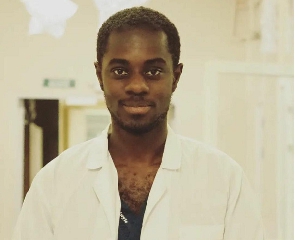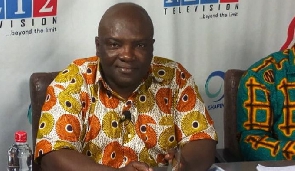Health News of Friday, 20 October 2023
Source: Simon Badu
Unveiling the complex terrain of multiple Sclerosis: Insights from a neurosurgeon - Dr Simon Badu
Multiple Sclerosis (MS) is a neurological disorder that has a devastating impact on millions of people worldwide. My career as a neurosurgeon has been closely entwined with the complexity of the human brain, and MS continues to be a difficult problem that we work to solve.
I hope to provide some insight into the complex nature of MS and the ongoing initiatives to comprehend and treat this complex condition in this piece. The brain and spinal cord are both part of the central nervous system, which is affected by the autoimmune disease known as multiple sclerosis.
The immune system accidentally attacks the myelin sheath that surrounds nerve fibers in this condition, causing inflammation, damage, and a variety of neurological symptoms.
Every person's experience with MS is different, and this characteristic of the condition is well documented. While some may experience minor, sporadic symptoms, others can struggle with more serious, ongoing issues.
For patients with MS to receive individualized care, it is crucial to comprehend this variation.MS is a disorder that is particularly difficult to detect and treat due to its fluctuating nature.
Fatigue, limb numbness or weakness, poor coordination, eyesight issues, and even cognitive abnormalities might be symptoms. MS is erratic; although some people only experience modest symptoms, others are severely disabled. Clinical assessment, medical history, neurological examinations, and diagnostic testing like magnetic resonance imaging (MRI) scans are frequently combined to make the diagnosis of MS.
These tests support early diagnosis and treatment planning by assisting medical practitioners in identifying typical MS lesions in the brain and spinal cord. Although neurosurgery is not the primary method of MS therapy, it is extremely important in the process of diagnosis and the investigation of prospective therapeutic strategies.
Visualizing MS-related lesions in the brain and spinal cord requires the use of neuroimaging techniques like magnetic resonance imaging (MRI). Neurologists use these scans to monitor the course of the disease and establish precise diagnoses.
Additionally, lumbar punctures (spinal taps), a neurosurgical operation, can be useful in acquiring cerebrospinal fluid samples for diagnostic purposes, aiding in the confirmation of MS.
Significant advancements have been made in the field of treating MS over the years. Despite the fact that there is no cure for MS, there are medicines that can effectively manage the condition and enhance the quality of life for patients. These treatments can be divided into numerous groups:
1. Disease-Modifying Therapies: These drugs work to lessen MS relapses' frequency and severity. They function by altering the immune system's reaction and halting the spread of the illness.
2. Symptomatic Management: MS-specific symptoms such as fatigue, muscle spasms, and bladder dysfunction can be managed with medications and therapies.
3. Rehabilitation: Patients can preserve their mobility, independence, and general function with the support of physical therapy, occupational therapy, and speech therapy.
4. Experimental Treatments: Ongoing research explores promising new therapies, including stem cell transplantation and immunomodulatory treatments, which offer hope for improved outcomes in the future.
It is crucial to understand that a multidisciplinary approach is important as we negotiate the challenging terrain of MS. In order to provide complete care for MS patients, collaboration between neurologists, neurosurgeons, physiotherapists, and other healthcare providers is essential.
Supporting organizations and research projects aimed at expanding our understanding of MS is also essential. We can all work together to create a future where MS is better understood, better controlled, and maybe even cured one day by funding research, fighting for new therapies, and promoting awareness.
Although multiple sclerosis is still a difficult and complex neurological disorder, there is still hope. For MS sufferers, new discoveries in research and treatment choices give them reason for hope. As a neurosurgeon, I am motivated by the tenacity of my patients and the possibility of future discoveries that may alter the course of this illness.
We can work together to create a better future where MS no longer has such a negative impact on the lives of individuals who are impacted by it. Together, we can successfully negotiate the complex terrain of MS with tenacity, empathy, and the steadfast conviction that science and creativity will triumph.
Neurologists, nurses, physical therapists, occupational therapists, and other healthcare professionals work together to manage MS in the majority of cases.











